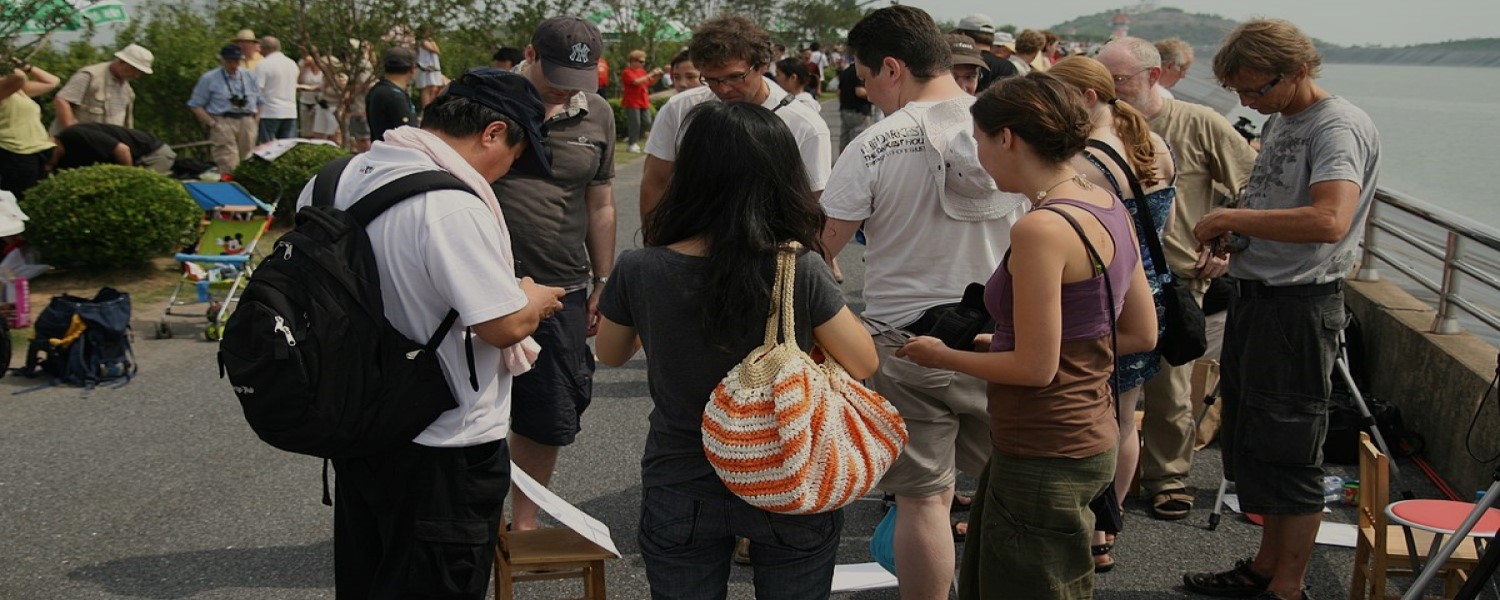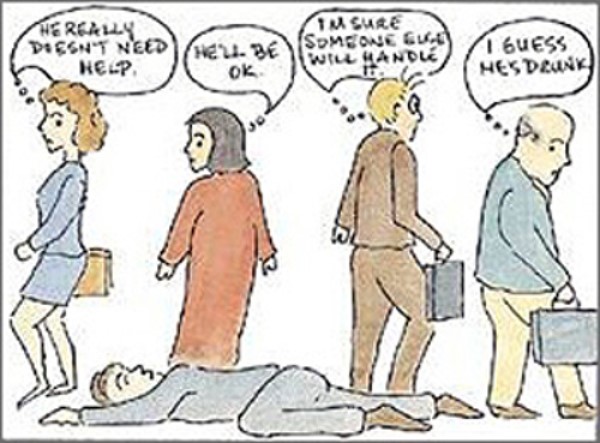The Bystander Effect: So…What Would You Do?
You are at a grocery store and you see someone come in, grab an item and walk out without paying. What do you do? As you are walking home from work along a crowded city street, you witness 3 teenagers harassing a homeless man. What do you do? While standing in line to get into a club you witness a rude bouncer deny a man entry because he is overweight. What do you do? Before you answer, let’s first discuss a phenomenon called the bystander effect, also known as bystander apathy.

Let’s Travel Back in Time to 1964 in New York City…
…where a young woman named Kitty Genovese was walking home from work on a March night when she was brutally attacked and murdered by a man named Winston Moseley. Despite her calls for help, none of the ‘reported’ 38 witnesses in the nearby apartments called the police until after the attacker fled the scene and Genovese had died. This case was initially reported in a 1964 New York Times article that of course caused quite a stir. It has also been cited and used in introduction to psychology textbooks over the years, which is where I first learned about it.
I say ‘reported’ above because according to a 2007 article in American Psychologist, the original New York Times piece was highly sensationalized and inaccurate. It turns out that the claims made in the article were exaggerated – there were a lot less than 38 eyewitnesses, many of the bystanders could not actually see the attack, and the police were called at least once.
However, the Genovese case did cause a couple of social psychologists, John Darley, and Bibb Latané to become interested in the topic of the bystander effect. After hearing about her case, they wanted to know why no one intervened, which caused them to launch a series of experiments.
What is the Bystander Effect?
“The bystander effect refers to the phenomenon that an individual’s likelihood of helping decreases when passive bystanders are present in a critical situation.” 2
In other words, the presence of others makes us less likely to do something in an emergency situation.
The failure of people to act due to the bystander effect not only affects how we behave on streets filled with strangers but also how we behave in other places. This can have wide-ranging negative repercussions from avoiding seemingly minor conflicts with roommates and friends to more serious instances of violence and abuse.
Interesting, Right? So…What Causes the Bystander Effect?
The early research by Darley and Latané identified 3 main reasons why passive bystanders fail to help someone who is in a critical situation 3:
(1) Diffusion of responsibility: meaning the more people there are, the less personal responsibility each person will feel to do anything.
(2) Evaluation apprehension: meaning people are scared of being judged by others when acting publicly. In other words, people don’t want to make a mistake while being observed which makes them less likely to intervene.
(3) Pluralistic ignorance: meaning people look at how others react to a situation. If others don’t do anything it must not be serious or an emergency.
But…Maybe There is Hope!
A 2011 meta-analysis of all the bystander effect studies done to date shows that the bystander effect is “less pronounced especially in dangerous emergencies gives hope that we will receive help when help is really needed even if there is more than one witness of our plight.” 4
According to the study: “The bystander effect was attenuated when situations were perceived as dangerous (compared with non-dangerous), perpetrators were present (compared with non-present), and the costs of intervention were physical (compared with non-physical). This pattern of findings is consistent with the “arousal-cost-reward” model, which proposes that dangerous emergencies are recognized faster and more clearly as real emergencies, thereby inducing higher levels of arousal and hence more helping.” 4
Is There Anything We Can Do to Mitigate the Bystander Effect?
Possibly – it all depends on the situation and the many factors that may be involved.
Researchers have identified a couple of ways that may help us not fall into the trap of inaction.
(1) Awareness: Simply being aware of the bystander effect has been suggested by psychologists as one of the ways to break the cycle. Knowing what the bystander effect is and how it holds you back may be enough to get you to take the conscious steps to overcome it.
(2) Singling someone out: Another suggestion, if you are the one who needs help is to single someone out in the crowd to help you. The idea is to establish eye contact with someone and then specifically ask them for assistance.
Now, Understanding Something Intellectually…
…and taking action when the chips are down are two entirely different things. So, let’s go back to the questions I asked in the introduction:
You are at a grocery store and you see someone come in, grab an item and walk out without paying. What do you do? As you are walking home from work along a crowded city street, you witness 3 teenagers harassing a homeless man. What do you do? While standing in line to get into a club you witness a rude bouncer deny a man entry because he is overweight. What do you do?
Would you answer them differently now after reading this blog post and having a better understanding of the bystander effect and what causes it?
I suppose none of us really know for sure until we are in such a situation ourselves. Hopefully just being aware of the bystander effect will cause us to answer the following question differently than we did before:
What would you do?
Until next time, be aware of the bystander effect and as always…PYMFP!
–Rick

Use It or Lose It
A couple of things suggested by researchers to not fall into inaction caused by the bystander effect are:
(1) Awareness: Simply being aware of the bystander effect has been suggested by psychologists as one of the ways to break the cycle. Knowing what the bystander effect is and how it holds you back may be enough to get you to take the conscious steps to overcome it.
(2) Singling someone out: Another suggestion, if you are the one who needs help is to single someone out in the crowd to help you. The idea is to establish eye contact with someone and then specifically ask them for assistance.
When to Use It:
When you think you may be affected by the bystander effect either by being a bystander yourself or being the person who needs help.
What Do You Think?
Have you ever personally experienced the bystander effect? Please share your thoughts in the comments below!
If you enjoyed this post, it would mean the world to us if you shared it with people you care about via any of the social media platforms below!
Popular Previous Posts:
This is How to Deal with a Meritocracy at Work!
13 Witty Quotes to Make You Smile, Laugh, and Ponder Life
18 Unconventional Productivity Hacks to Save You Time!
Proposing a Toast: Some Do’s and Don’ts You Need to Know!
Autonomy, Mastery, Purpose: This is How to Motivate Others!
References
1 Latané, B., & Darley, J.M (1969). Bystander “apathy.” American Scientist, 57, 244-268.
2 Darley, J. M., & Latane´, B. (1968). Bystander intervention in emergencies: Diffusion of responsibility. Journal of Personality and Social Psychology, 8, 377–383. doi:10.1037/h0025589
3 Latane´, B., & Darley, J. M. (1970). The unresponsive bystander: Why doesn’t he help? New York, NY: Appleton-Century-Croft.
https://www.psychologytoday.com/us/basics/bystander-effect
4 Fischer, Peter; Krueger, Joachim I.; Greitemeyer, Tobias; Vogrincic, Claudia; Kastenmüller, Andreas; Frey, Dieter; Heene, Moritz; Wicher, Magdalena; Kainbacher, Martina (2011). “The bystander-effect: A meta-analytic review on bystander intervention in dangerous and non-dangerous emergencies”. Psychological Bulletin. 137 (4): 517–537. doi:10.1037/a0023304. PMID 21534650.

Hi,I check your new stuff named “The Bystander Effect: So…What Would You Do? – Prime Your Pump” daily.Your humoristic style is witty, keep doing what you’re doing! And you can look our website about proxy list.
Ì am aware of the bystander effect. I learned about it in a psychology course. I agree that if we place ourselves in the victim’s situation, we are more likely to give assistance and encourage other bystanders to help.
I will try and check out the TV show you mention. There are 2 ABC networks on the cable here, so if not on one, should be on the other.
I remember the Genovese murder quite well. It happened in a section of Queens known as Kew Gardens, an upscale area. Yes, the Times did sensationalize the story, which seemed most unusual, as the Times is known for being conservative.
I might add here that during the summers of my high school years, I worked for a city-wide delivery service based in Manhattan. Since I did not know in advance where I might be going to deliver items on any given day, I carried a blade with me. Never had to use it, but did put my hand in my pocket on several instances. Better to be prepared than to be a victim. It’s called ‘street smarts’ or if you prefer ‘situational awareness’, read and assess the situation, then be proactive – cross the street to the other side, take a detour through a back alley, get off the subway early and wait for the next train – anything to avoid a potential confrontation.
There are many reported instances of non-apathy out here, both on TV and in the local paper. People pulling the driver out of a crashed car, a woman beating on neighbor’s doors telling them to get out because of a fire in the building, a man using his chain saw to cut up a tree that has fallen on someone in a storm. Stuff like that. Of course if the bystander effect did occur, how would anyone know about it?
Hi Dave, Yup exactly, Kew Gardens, definitely surprising the Times sensationalized it. To answer your question, I think people would know about it if they were the victim and no one helped them. And I guess if it was newsworthy and publicized – I think bullying is a good example these days. By the way, there is a TV show called What Would You Do on ABC where that is based on the bystander effect, they create different situations, see what people do, then a couple psychologists Monday morning QB it to analyze what did/didn’t happen. Be good, Rick